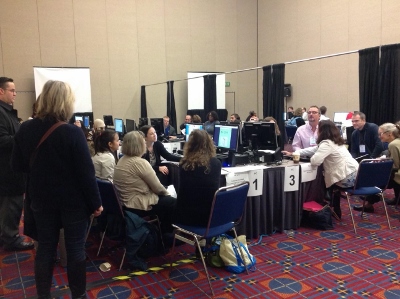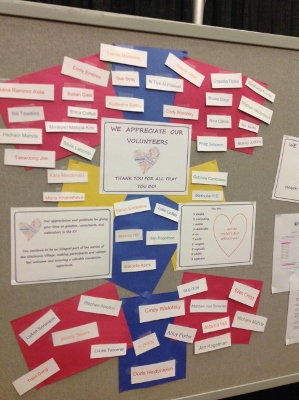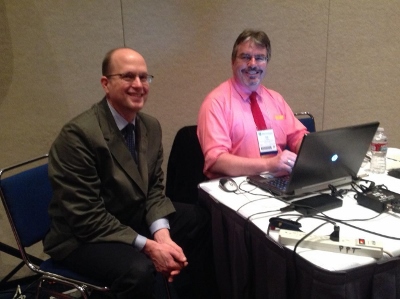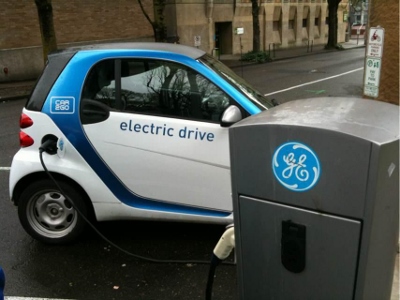|
This year I was lucky enough to be the IATEFL LT SIG
representative at the annual TESOL convention, held in Portland,
Oregon.
The Venue
The conference venue in Portland is very “West Coast,” which I
gather means a little idiosyncratic or quirky. Doing a quick bit of
research on the web prior to going, I discovered two key facts: Portland
has more strip clubs per capita than any other U.S. city, and it holds
the annual Naked Bike Ride (strap line: As bare as you dare). So I was
relieved to find the audiences were fully clothed during my talks. In
fact, grunge is the city dress code, and Portland has a very
eco-conscious vibe with an excellent electric public transport system
and plenty of rain (the locals eschew umbrellas in favor of quirkily
oversized hoodies). Happily, grunge was not the dress code for
conference delegates, and even more felicitously, we were given free
passes to use the electric trams and the city buses for the duration of
the conference. This made getting around what is in fact a fairly
compact (and attractive) city fantastically easy.
For the past several years, the British Council has generously
been funding an exchange between the IATEFL LT SIG and our U.S. cousins
in the TESOL CALL-IS. My exchange trip followed those of previous years
by past LT SIG coordinators Gary Motteram, Sophie Ioannou-Georgiou, and
Paul Sweeney. And in turn, we've had CALL-IS members attending the
annual IATEFL conference for the past few years: Phil Hubbard, Greg
Kessler, Deborah Healey, and this year Elizabeth Hanson-Smith have all
crossed the pond (see Elizabeth's article about her experiences in
Harrogate, England, in this issue). Meeting our CALL-IS colleagues this
year resulted in renewed ties with the LT SIG, and building on the solid
groundwork laid by previous exchanges, a number of joint ventures and
projects are being carried forward (Elizabeth outlines these in her
article).
The Conference
For first-time TESOL attendees such as myself, the first
impression of the conference is size. The venue is always huge, the
number of delegates massive (6,000–8,000 depending on the city), and the
number of surrounding coffee and muffin venues plentiful. And of course
the number of parallel talks, and exhibitors in the Exhibition Hall, is
suitably large. All compared to the much smaller IATEFL conferences of
2,000+ delegates.
There is also a suitably large and varied array of full- and
half-day pre- and postconvention institutes (PCIs) or events to choose
from—35 in total this year. Of particular interest to me were the
Educational Site Visits one could take part in on the day before the
official conference started. This year's site visits included trips to
an immigrant and refugee EFL centre, an intensive English language
program at a local university, as well as local elementary and middle
schools.
I chose to do a visit to Portland State University (PSU), which
showcased a mobile augmented reality game they have developed called
ChronoOps, based on the free ARIS app. During the visit we learned about
the background to the game and then spent a while playing it on our
mobile devices around the PSU campus. The game uses geofencing to teach
students about the (impressive and prize-winning) green credentials of
the university campus while practising their English. An iOS version of
the game is ready, and an Android version of the game is in development.
You can find out more about the game at PSU here.
More interesting than the sheer numbers at TESOL were the range
of talk types and topics. For individual presenters these tended to be
30–45 minutes long. There were also 60- to 90-minute panel sessions,
with a series of speakers discussing a single topic. Each speaker
typically had 20 minutes, with time for questions from the audience at
the end. These panel sessions were my favourite, as a single topic could
be covered from a variety of angles and in some depth.
Technology Talks
I attended mainly the technology strand talks put together by
the excellent CALL-IS team. The CALL-IS schedule of talks and Electronic
Village (EV) sessions is in fact so comprehensive, it even had its own
paper programme, entirely separate from the main conference book (or
rather, tome). Technology has always been very much present in TESOL,
with the inspiring EV forming its centrepiece for a least the past
decade. Tables equipped with laptops and screens form a series of
stations in the EV, where short, hands-on or demo sessions are offered
by volunteers. Delegates can wander in and sign up for these sessions as
they like, and there is a pleasant and constant buzz of people and
activity in the EV room throughout the conference.
In an adjacent room, more formal panel sessions were held on a
series of Hot Topics. I was invited to take part in two panels—one on
the flipped classroom and the other on mobile learning. Here's a quick
summary:
- Flipping the classroom in multiple contexts: This panel was presented by Justin Shewell and kicked off with
Carol Kubota, Cynthia Murray, and Catherine Warner (all from ASU) on
flipping the classroom in EAP contexts. They were followed by Christine
Bauer-Ramazani (St. Michael's College) on flipping in online teacher
training courses. And finally, I looked at how mobile devices can
support the notion of the flipped classroom. You can find the recording
of this event here (audio
and slides), with further information about the presenters here.
- Teacher education in CALL: The second
panel event, presented by Aaron Schwartz, examined teacher education in
CALL. It included presentations from Phil Hubbard (Stanford University)
on interpreting and integrating the TESOL Technology Standards in a CALL
mini-course; Joy Egbert (Washington State University) on guidelines
that teachers need to understand when thinking about and looking for
effective technologies; Greg Kessler (Ohio University) on preparing
language teachers for the future by rethinking pedagogy in a world of
social media, hyper-collaboration, and data mashups; and my own
presentation on the implications of digital literacies for teacher
education courses. You can find the recording of this event here (audio and slides; note
that sound starts around 14 minutes in), with further information about
the presenters here.
- Other TESOL tech events included talks on
mobile, social networking, using technology to avoid plagiarism, and a
number of webcasts from the Electronic Village. You'll find a complete
list plus links to the audio and slide recordings here. Plenty here to get you
right up to speed with technology in teaching!
Other Talks
And what of the conference overall? When I managed to drag
myself away from the CALL-IS track, I saw mainly the plenaries. These
were wide-ranging talks by Surin Pitsuwan, David Graddol, Deena Borraie,
and Diane Larsen-Freeman. Here are details of the plenary
topics.
Overall there is more of an emphasis on academic talks at
TESOL, with fewer practice-based sessions than one typically finds at
IATEFL. There are also talks focused on K12 (primary and secondary
school-age learners) and especially on those in mainstream schooling who
need English language support. There are also plenty of EFL-based talks
at TESOL, reflecting the fact that there are significant numbers of
international delegates as well. Apart from meeting many North Americans
from the United States and Canada, I got to talk to people from
Cameroon, the Philippines, Japan, Thailand, and several countries in
Europe and Latin America.
After Hours
And the conference nightlife? Unlike IATEFL's
publisher-sponsored parties and get-togethers, TESOL attendees do their
own thing at night. I got to hang out with some of my friendly CALL-IS
colleagues. There were a number of microbreweries for us to visit,
another famous facet of Portland, along with the largest family-run
bookstore in the United States (Powell's Books), and a doughnut joint
called Voodoo Doughnuts whose specialities include jalapeño or maple
syrup and bacon doughnuts.
I thoroughly enjoyed the TESOL conference, getting to meet our
CALL-IS colleagues, the great variety of talks and sessions—and, in case
you haven't guessed, Portland itself! A huge thank you to the British
Council for enabling this exchange to continue.

The Electronic Village

A public thanks to the Electronic Village volunteers

Hot Topic sessions webcast team: Larry Udry (L) and Jack Watson (R)

Portland's green credentials: electric car and charging station
Nicky Hockly is joint coordinator of the IATEFL LT
SIG. In her day job, she is director of pedagogy of The
Consultants-E, an award-winning online
training and development organisation. She has worked in the field of
ELT since 1987, is an international plenary speaker, and gives seminars,
in-service workshops, and teacher training courses for practising
language teachers all over the world. Nicky has co-written several
methodology books on the application of new technologies to language
teaching, the most recent of which is on mobile learning
(Going Mobile, 2014, with Gavin Dudeney). Nicky lives
in Barcelona, Spain, and is a technophobe turned
technophile. |

